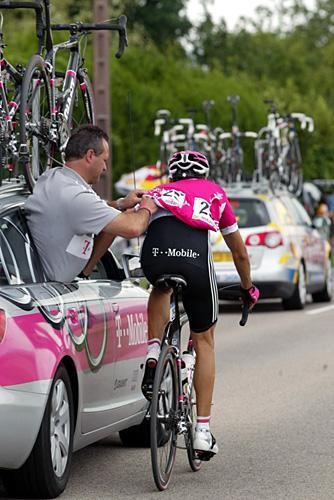UCI bans race radios in U23 races
By Monika Prell One of the most controversial discussed inventions in the world of cycling is the...

By Monika Prell
One of the most controversial discussed inventions in the world of cycling is the use of the radio. The supporters argue that it facilitates a lot of the work of the entire team: If a rider has a flat tyre or crashes, he is able to announce it directly to his team car and the sport directors are able to remind their riders to eat and to drink, give them tactical advice and to react immediately to every change in the race. Those who oppose the radios, amongst them ex-professionals, reproach the system. Their arguments are that they fear a total control of the riders and the race by the directeur sportifs, and that the riders would lose their ability to analysis the race situations.
Now, the International Cycling Union (UCI) made a first effort and banned the radios in U23 category races. The Basque cycling federation (FVC) backed the prohibition; to make "the races more open and to make it so that the rider has more initiative," said Unai Yus, the technical director of the FVC, to Noticias de Gipuzkoa.
The reactions of the team directors are various. Opel Ibaigane Sport Director José Manuel García noted the advantages, "You will see who the keenest one in the race is. They will learn to read the races. With the radio, you control much more what happens, and I think that this favours the stronger teams, as they are able to stop their riders in breakaway groups or to defeat the breakaway's intent."
Rubén Gorospe of Café Baqué did not agree with the UCI's decision. "I don't think that this is a good measure. I could understand it if this decision was taken for the junior cyclists, because it still is a game, but in the U23 there are many more things that play a role. Without the radio, we almost don't have any information during the races. Normally, we use it more to know the race situation than to give instructions, as often the frequencies cross and you can hear the others, as well as the others are able to hear you.
"Without the radio, the cyclists would have more liberties," Gorospe admitted, but warned, "I don't know if this is good or not. The races will be crazier. Cycling is the only sport where you don't have a direct access to the rider. ... The radio is a progress, now we take a step backwards."
CAI Sport Director Carlos Canales noted the riders' education first. "The U23 category is a category when you still have to educate the racers in the race; you have to tell them to eat, to drink, you have to advise them against some dangers... Furthermore, if Radio Vuelta [the official race radio - ed.] announces that one of your riders has a flat tyre, you already are with him because he advised it to you earlier." Canales added, "We will return to the bare wonder, like in the 1970s."
Get The Leadout Newsletter
The latest race content, interviews, features, reviews and expert buying guides, direct to your inbox!
The UCI announced on February 15 that it formed a "working group" to "treat the question of radio transmissions and coaching during competitions. In particular, it will consider the use of earphones." Further discussion of this issue, and its regards to top-tier professional races is expected at UCI Management Committee meeting in Copenhagen this June.